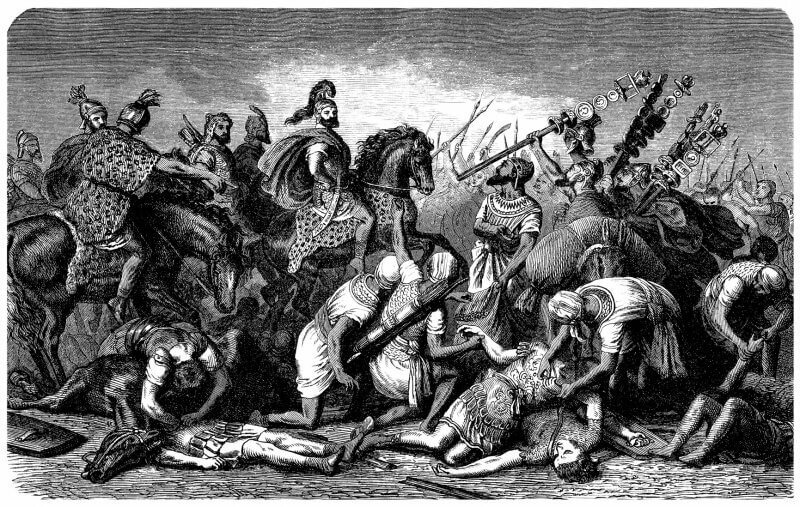Mercenary War
Miscellanea / / July 04, 2021
By Guillem Alsina González, in Dec. 2017
 Although the Punic Wars were the conflict best known in which Carthage participated, he was not the only one; precisely, at the end of the First Punic War, a conflict broke out between Carthage and the mercenaries it had hired to fight Rome.
Although the Punic Wars were the conflict best known in which Carthage participated, he was not the only one; precisely, at the end of the First Punic War, a conflict broke out between Carthage and the mercenaries it had hired to fight Rome.
The so-called "War of the mercenaries" was a conflict that occurred between 241 and 238 BC. C. that faced on the one hand Carthage and a series of allied cities, against mercenary troops and other cities of North Africa.
It should be remembered that, like all the great armies of classical antiquity (including the Roman), in the Carthaginian they had much prominence foreign auxiliary troops, hired as mercenaries, even more than among the forces Roman.
It is also necessary to explain that Carthage sustained its military might in a flourishing Commerce, which led it to be a very rich city, with which it could pay its employees well and on time.
This wealth largely disappeared after the defeat in the First Punic War, since in addition to the territorial losses (and, consequently, of property), the
city State North African had to face large war reparations to the Romans.If to this we add the deterioration in its image as a military power and the moment of weakening that suffered, we left the field open for his enemies to consider the possibility of pouncing on Carthage.
After the mercenary contingents had been repatriated after the war, the Carthaginian general Hannón went to his camp to inform them that the city's coffers were empty.
This would delay the collection of their soldier but, in addition, the Carthaginian senate asked them to renounce a part of it, uncollectible for all purposes.
Presumably whoever put this plan on the table to ask an army of mercenaries armed to the teeth to They had risked their lives to defend Carthage, to have them renounce a part of their salary, which he should not have thought very carefully about.
Angry, the mercenaries camped in present-day Tunis, near Carthage, and caused riots until they forced Carthage to pay them.
The Carthaginian senate gave in, and sent General Giscón with the soldiery due to the mercenaries, but the latter They took Giscón prisoner and seized the treasure he was carrying, although with no intention of ceasing their rapine; they had seen a weak Carthage, and they intended to take advantage of it.
The mercenary generals sent letters to the tributary cities of Carthage, inciting them to shake off the Carthaginian yoke.
As a consequence of having to pay the burdensome indemnities to Rome, the feudal cities of Carthage had seen increased the taxes that they had to pay to the city, for which they received with predisposed spirit the letters of the rebels.
Apart from Bizerte and Utica, which remained loyal to Carthage, the other North African cities under control Punic joined the rebellion, turning what was a military rampage into an all-out uprising. rule.
Hannón was the general appointed by Carthage to confront the rebel side.
He found himself in a precarious situation for his troops, since the treaty of peace with Rome he had reduced his fleet to the minimum expression, as well as demobilized his army, which meant that there were no weapons or supplies ready.
Instead, the city enjoyed excellent and well-prepared walls to withstand the onslaught of an army (as it would demonstrate in the Third Punic War).
The mercenaries sent an embassy to Rome, from which they expected support.
They did not count on the Romans giving priority to the debt that Carthage had contracted with them and, therefore, they facilitated the North African city recruited mercenaries from Rome's allies, and supplies were sent to it to be able to withstand a siege.
Hannon's campaign, to which Rome had contributed generously, began successfully with the liberation of the allied city of Utica, which the rebels had besieged, but continued with a series of defeats.
The rebel mercenaries knew about the strategy and Carthaginian tactics, and waged a guerrilla war against Hannon's superior army.
That is why in 240 a. C. the Carthaginian senate appointed Hamilcar Barca commander of his forces.
Hamilcar quickly broke through Carthage and Utica, and fell on the rebels by surprise, using a retreat simulation tactic that caused enemy troops to attack in a disorderly manner and thus was able to beat them. This eased the pressure on Carthage and Utica.
While all these events were unfolding in North Africa, the mercenary garrisons of the island of Sardinia also rebelled against Carthage.
In addition, a first Carthaginian contingent sent to subdue them also crossed sides, joining the rebel mercenaries.
The horrendous treatment of Carthaginian prisoners by the revolted mercenaries led to just as horrible reprisals from the Punic side.
To be taken prisoner in that conflict was to be savagely tortured to death, for part of either side, which led to it being known also as "war inexpiable ”.
This also explains why, once the mercenary troops stationed in Sardinia were revolted, they began to systematically execute the Carthaginian inhabitants of the island.
The rarity of the warlike climate coincided with the defection of Bizerte and Utica, until then allies of Carthage, which put in difficulties the Carthaginian side, which until then had been taking the lead in terms warlike.
Seeing Carthage again weakened (it had no possessions left except the city itself), the rebels set out to besiege it, although they were intercepted on the way by Hamilcar's army.
This general sought battle in a territory suitable for guerrilla warfare and which therefore seemed to initially favor the rebel mercenaries, but which was used by Carthaginian troops (better acquainted with the geography) for their own benefit.
The result was Carthaginian victory, thanks to which many cities returned to obedience to Carthage.
While all this was happening, Rome did not sit idly by: she sent an expedition to Sardinia to pacify it, although her intention was clearly to stay with the island.
In fact, and before the protests of Carthage, he even declared war on the North African metropolis, but it refused combat and preferred to increase the payment of the compensation contracted with the city of the Tiber rather than starting a war that she knew was lost beforehand.
Rome would take control of both Sardinia and, shortly after, that of Corsica.
In Africa, Hamilcar went on the offensive, and besieged Tunisia, which was saved, although in the last confrontation between both sides, the rebel army was annihilated.
Shortly afterwards, Bizerte and Utica surrendered, curiously the only two cities that had remained loyal to Carthage at the the confrontation began, and that they were the last rebel cities to capitulate once they had already switched sides.
Photo: Fotolia - Erica Guilane Nachez
Themes in Mercenary War


